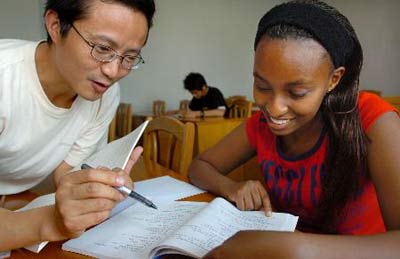Guillaume Moumouni from Benin is studying for a doctorate of international politics at Peking University in Beijing. He came to China in 1990 as an undergraduate student on a Chinese Government Scholarship and went on to complete his graduate studies here. "Each time I came back to China I always found China had made big progress both economically and politically," he said.
More African students are expected to arrive as China plans to double the quota of Government Scholarships for them, a senior official said.
The number of African students who can access scholarships could rise from the existing 2,000 a year to at least 4,000 by 2010, according to Li Jianmin, deputy secretary-general of China Scholarship Council. They are responsible for the organization, management and provision of the scholarships.
The Council figures show that China has increased the scholarship quota for African students from last year's 1,300 to around 2,000. This is about a quarter of the total offered to foreign countries.
Most of them take majors such as physics, electronics, telecommunications, medicine, agriculture, and computer science in the big cities including Beijing, Shanghai and Guangzhou.
Sponsored students have their tuition fees waived and receive a monthly subsidy ranging from 800 yuan (US$100) to 1,400 yuan (US$175). The scholarship period varies from one to seven years.
In 1956 China hosted its first four foreign students. They were from Egypt which established diplomatic relations with China that year. It opened a new chapter in the history of educational exchanges for China.
As several African nations gained independence in the 1960s and established diplomatic ties with China more students arrived. African students have also brought to China their unique experiences and colorful cultures. Li described it as a "win-win situation."
However, while the number of sponsored students is growing rapidly those who come to China at their own expense remains limited. According to the Ministry of Education only 1,390 self-funded African students came last year accounting for just 2 percent of the total 141,087 foreign students in China.
Money is considered the biggest obstacle, Li said. He reiterated that the Chinese Government welcomes African students and will offer them more help.
Meanwhile an increasing number of African students come to China on scholarships from their home countries. The Tanzanian and Rwandan governments signed agreements with the Council last year to set up scholarships for their students wishing to study in China.
Li said such a model would be further promoted as many African countries have realized that what students learn in China has practical value as they have much in common and study is more economical than in Western countries.
Another student from Zambia who came to Beijing last year recalled the exciting moment when he saw snow. "It was my first time to see real snow," Nkuye Moyo said. "I rushed out to the yard and walked on the snow with only slippers and shorts on. It must be the most beautiful moment for many African students like me."
(China Daily November 3, 2006)

